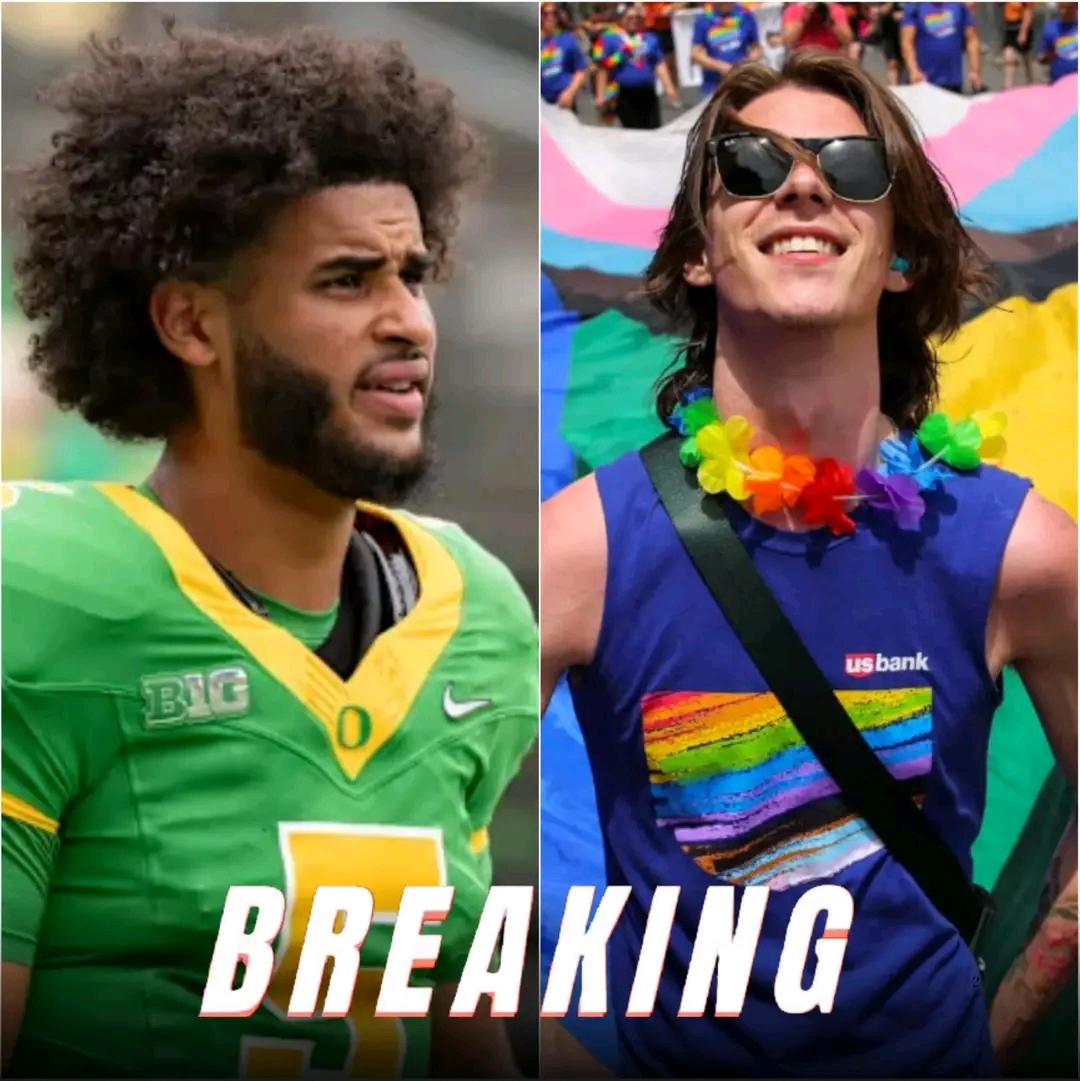BREAKING NEWS SHAKING THE NCAA: Oregon Ducks Star Dante Moore Refuses to Wear LGBT Armband, Sparks Nationwide Controversy Over ‘WOKE’ Agenda
In an unprecedented move that has shaken college football and ignited fierce debate nationwide, Oregon Ducks’ rising star quarterback Dante Moore stunned fans, teammates, and officials alike by refusing to wear the NCAA-mandated LGBT pride armband this past weekend. This controversial decision came just days before Oregon’s crucial upcoming game, and Moore’s blunt criticism of what he termed the “WOKE” agenda has sent shockwaves through the sports world and beyond.
Known for his electric gameplay and leadership on the field, Dante Moore’s refusal was no quiet act of defiance. During a press event ahead of the game, Moore made his position crystal clear: “Football is a sport that brings people together, but I do not believe in celebrating a political agenda that I view as divisive and unworthy of being worn on my arm. This ‘WOKE’ culture has spiraled out of control. It’s football, not a platform for social activism that alienates so many.”
The armband in question was introduced by the NCAA as part of their initiative to show solidarity with the LGBTQ+ community during the football season. Several players from various schools have embraced the symbol as a gesture of inclusion, but Dante Moore’s outspoken rejection has opened a torrent of controversy.
Fierce Reactions Across the Nation
Reactions to Moore’s stance have divided fans, players, and experts into two camps. Many supporters applaud his courage to speak openly in a climate they often describe as intolerant of dissenting views. Social media platforms have been flooded with hashtags such as #StandWithDante and #NotWoke, praising his willingness to take a stand for personal beliefs.
Conversely, civil rights advocates, LGBTQ+ organizations, and a growing number of sports analysts have condemned Moore’s refusal as harmful and potentially damaging to the inclusivity that many argue is essential in today’s sports environment. Critics allege that his comments reflect a reluctance to uphold values of respect and equality on a highly visible stage.
Sarah Kemp, Director of the National LGBTQ+ Sports Alliance, responded to Moore’s statement: “Dante Moore’s choice to reject the LGBT armband is disappointing and undermines the progress we have made toward acceptance. Sports should be a safe space for every athlete, regardless of who they love.”
NCAA Caught in the Crossfire
The NCAA has remained largely silent since the incident but is reportedly reviewing its policies and their impact on athletes with diverse viewpoints. In an internal memo leaked to the press, NCAA officials expressed concern about balancing inclusivity initiatives with respecting players’ freedom of expression, a debate that has intensified since the controversy erupted.
University of Oregon’s head coach, Marcus Bell, addressed the situation cautiously: “Dante is a vital part of our team, and while we respect his opinions, we also support our efforts to make sports inclusive for all players and fans. We hope this situation will serve as a catalyst for open and respectful dialogue.”
Impact on Team Dynamics & Future of NCAA Policies
The Oregon Ducks enter their next game under a cloud of uncertainty, with many wondering how Moore’s statements will affect team chemistry. Some teammates have voiced private support while others have expressed discomfort with the ongoing uproar. This drama threatens to overshadow the Ducks’ performance on the field in a critical part of the season.
Moreover, the incident has reignited a national conversation about the role of social movements within sports. Should athletes be required or encouraged to wear symbols of causes on the field? Is sports a place for advocacy, or should it remain neutral ground focused solely on competition?
### What’s Next?
Dante Moore’s refusal has already triggered calls from sports organizations, advocacy groups, and university stakeholders to revisit the NCAA’s approach to activism and player expression. As tensions mount, this story is far from over.
Fans and observers across the country are watching closely as the NCAA, Oregon Ducks, and Moore himself navigate this complex cultural and ethical dilemma. Could this spark a major shift in how college sports balance inclusion with free speech? Or will Moore face penalties or backlash for his bold stand?
One thing is certain: the NCAA landscape has been shaken, and the debate Moore ignited promises to dominate headlines for weeks to come.
